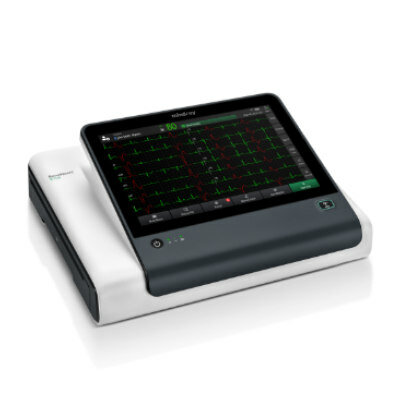Video Game Helps Rehabilitate Cognitive Impairment 
|
By HospiMedica International staff writers Posted on 16 Nov 2015 |

Image: Cognitive training with the Intendu Functional Brain Trainer (Photo courtesyof Intendu).
A novel training platform assists in the rehabilitation of patients suffering from cognitive impairment using adaptive, interactive video games.
The Intendu Functional Brain Trainer is designed specifically for adaptive and personalized training of people suffering from cognitive impairment resulting from traumatic brain injury (TBI), stroke, mental disease, neurodegenerative disease, and other brain dysfunctions. Users play engaging and cognitively challenging video games where they need to physically interact within real-life scenarios. Cognitive challenges are automatically adjusted to the patients' capabilities and rehabilitation needs, optimally stimulating their brain in real-time.
The Functional Brain Trainer can be used to train cognitive functions such as multitasking, memory, self-initiation, inhibition, and attention. Key aspects of the training platform include full body interaction to enhance brain plasticity processes; a neurocognitive engine that automatically adapts the games to patients' capabilities and needs; and dynamic and realistic environments that provide motivating rewards and a scoring system to ensure ongoing motivation for continuous training, as well as patient compliance.
The platform is grounded on neuroplasticity principles, evidence-based paradigms, and research that demonstrate that patients improve during training and that their performance is correlated with standard cognitive assessments. People with brain dysfunctions can access the platform immediately following injury in rehabilitation hospitals, continue in rehabilitation clinics, and later on in their own homes, providing continuity of care with constant tracking of performance and detailed progress reports. The Intendu Functional Brain Trainer is a product of Intendu (Herzliya, Israel).
“Therapists have limited training tools that engage the patients in daily living scenarios, and lack tools that can adapt to patients' needs and capabilities in real time,” said Son Preminger, PhD, MBA, MSc, CEO, and founder of Intendu. “The brain rehabilitation community faces a significant challenge in providing proper tools for patients to continue their cognitive rehabilitation after they have completed rehabilitation treatment. The Functional Brain Trainer seeks to provide that tool set.”
“The adaptive nature of the games allows patients of various levels to be engaged and challenged by the software,” said Dalise Robinson, MA-CCC/SLP, speech and language clinical manager at the Shepherd Pathways Center (Atlanta, GA, USA). “The body motion component makes the game experience more realistic and patients like it. We are currently using the Functional Brain Trainer and the feedback of both therapists and patients is very positive. We see also a great potential for the product in the home environment.”
Related Links:
Intendu
Shepherd Pathways Center
The Intendu Functional Brain Trainer is designed specifically for adaptive and personalized training of people suffering from cognitive impairment resulting from traumatic brain injury (TBI), stroke, mental disease, neurodegenerative disease, and other brain dysfunctions. Users play engaging and cognitively challenging video games where they need to physically interact within real-life scenarios. Cognitive challenges are automatically adjusted to the patients' capabilities and rehabilitation needs, optimally stimulating their brain in real-time.
The Functional Brain Trainer can be used to train cognitive functions such as multitasking, memory, self-initiation, inhibition, and attention. Key aspects of the training platform include full body interaction to enhance brain plasticity processes; a neurocognitive engine that automatically adapts the games to patients' capabilities and needs; and dynamic and realistic environments that provide motivating rewards and a scoring system to ensure ongoing motivation for continuous training, as well as patient compliance.
The platform is grounded on neuroplasticity principles, evidence-based paradigms, and research that demonstrate that patients improve during training and that their performance is correlated with standard cognitive assessments. People with brain dysfunctions can access the platform immediately following injury in rehabilitation hospitals, continue in rehabilitation clinics, and later on in their own homes, providing continuity of care with constant tracking of performance and detailed progress reports. The Intendu Functional Brain Trainer is a product of Intendu (Herzliya, Israel).
“Therapists have limited training tools that engage the patients in daily living scenarios, and lack tools that can adapt to patients' needs and capabilities in real time,” said Son Preminger, PhD, MBA, MSc, CEO, and founder of Intendu. “The brain rehabilitation community faces a significant challenge in providing proper tools for patients to continue their cognitive rehabilitation after they have completed rehabilitation treatment. The Functional Brain Trainer seeks to provide that tool set.”
“The adaptive nature of the games allows patients of various levels to be engaged and challenged by the software,” said Dalise Robinson, MA-CCC/SLP, speech and language clinical manager at the Shepherd Pathways Center (Atlanta, GA, USA). “The body motion component makes the game experience more realistic and patients like it. We are currently using the Functional Brain Trainer and the feedback of both therapists and patients is very positive. We see also a great potential for the product in the home environment.”
Related Links:
Intendu
Shepherd Pathways Center
Latest Health IT News
- Printable Molecule-Selective Nanoparticles Enable Mass Production of Wearable Biosensors
- Smartwatches Could Detect Congestive Heart Failure
- Versatile Smart Patch Combines Health Monitoring and Drug Delivery
- Machine Learning Model Improves Mortality Risk Prediction for Cardiac Surgery Patients
- Strategic Collaboration to Develop and Integrate Generative AI into Healthcare
- AI-Enabled Operating Rooms Solution Helps Hospitals Maximize Utilization and Unlock Capacity
- AI Predicts Pancreatic Cancer Three Years before Diagnosis from Patients’ Medical Records
- First Fully Autonomous Generative AI Personalized Medical Authorizations System Reduces Care Delay
- Electronic Health Records May Be Key to Improving Patient Care, Study Finds
- AI Trained for Specific Vocal Biomarkers Could Accurately Predict Coronary Artery Disease
Channels
Critical Care
view channel
Ingestible Smart Capsule for Chemical Sensing in the Gut Moves Closer to Market
Intestinal gases are associated with several health conditions, including colon cancer, irritable bowel syndrome, and inflammatory bowel disease, and they have the potential to serve as crucial biomarkers... Read moreNovel Cannula Delivery System Enables Targeted Delivery of Imaging Agents and Drugs
Multiphoton microscopy has become an invaluable tool in neuroscience, allowing researchers to observe brain activity in real time with high-resolution imaging. A crucial aspect of many multiphoton microscopy... Read more
Novel Intrabronchial Method Delivers Cell Therapies in Critically Ill Patients on External Lung Support
Until now, administering cell therapies to patients on extracorporeal membrane oxygenation (ECMO)—a life-support system typically used for severe lung failure—has been nearly impossible.... Read moreSurgical Techniques
view channel
Pioneering Sutureless Coronary Bypass Technology to Eliminate Open-Chest Procedures
In patients with coronary artery disease, certain blood vessels may be narrowed or blocked, requiring a stent or a bypass (also known as diversion) to restore blood flow to the heart. Bypass surgeries... Read more
Intravascular Imaging for Guiding Stent Implantation Ensures Safer Stenting Procedures
Patients diagnosed with coronary artery disease, which is caused by plaque accumulation within the arteries leading to chest pain, shortness of breath, and potential heart attacks, frequently undergo percutaneous... Read more
World's First AI Surgical Guidance Platform Allows Surgeons to Measure Success in Real-Time
Surgeons have always faced challenges in measuring their progress toward surgical goals during procedures. Traditionally, obtaining measurements required stepping out of the sterile environment to perform... Read morePatient Care
view channel
Portable Biosensor Platform to Reduce Hospital-Acquired Infections
Approximately 4 million patients in the European Union acquire healthcare-associated infections (HAIs) or nosocomial infections each year, with around 37,000 deaths directly resulting from these infections,... Read moreFirst-Of-Its-Kind Portable Germicidal Light Technology Disinfects High-Touch Clinical Surfaces in Seconds
Reducing healthcare-acquired infections (HAIs) remains a pressing issue within global healthcare systems. In the United States alone, 1.7 million patients contract HAIs annually, leading to approximately... Read more
Surgical Capacity Optimization Solution Helps Hospitals Boost OR Utilization
An innovative solution has the capability to transform surgical capacity utilization by targeting the root cause of surgical block time inefficiencies. Fujitsu Limited’s (Tokyo, Japan) Surgical Capacity... Read more
Game-Changing Innovation in Surgical Instrument Sterilization Significantly Improves OR Throughput
A groundbreaking innovation enables hospitals to significantly improve instrument processing time and throughput in operating rooms (ORs) and sterile processing departments. Turbett Surgical, Inc.... Read moreBusiness
view channel
Expanded Collaboration to Transform OR Technology Through AI and Automation
The expansion of an existing collaboration between three leading companies aims to develop artificial intelligence (AI)-driven solutions for smart operating rooms with sophisticated monitoring and automation.... Read more















